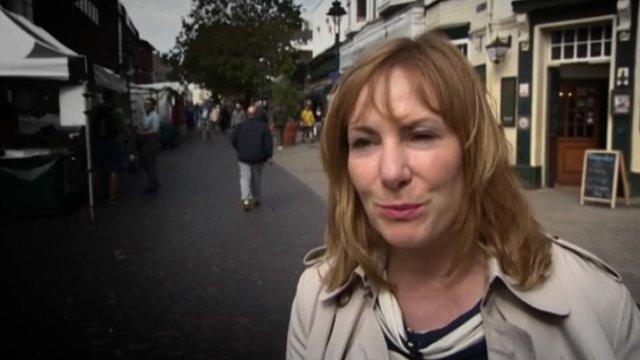Why is UKIP so popular in South East England?
- Published
- comments
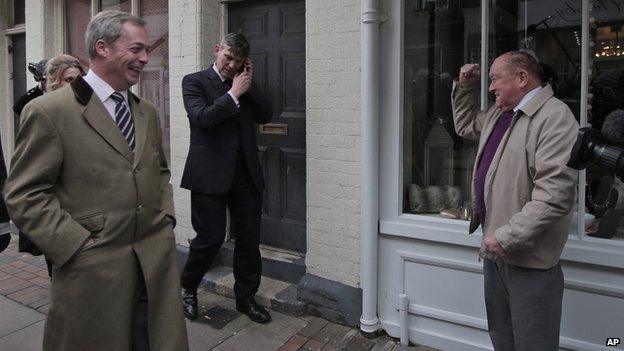
Nigel Farage walks past a UKIP supporter in Rochester following the party's by-election victory
It's now less than four months until the general election and campaigning is already under way.
The polls are so close it looks unlikely that either the Conservatives or Labour will win an outright majority and the South East MEP and UKIP leader Nigel Farage says his party could hold the balance of power in May.
I spent the day with Mr Farage in South Thanet for BBC South East Inside Out, where he is standing to be the next MP.
Mr Farage likes to think of himself as a man of the people - different from what he calls the "Westminster elite".
And it's true that not many politicians receive the kind of reception he does as we wander along the High Street in Broadstairs.
A man stops him to ask for his autograph and a woman shouts: "I love you Nigel," to which he quips: "Things are looking up."
Over the past 12 months things have been looking up for UKIP in the polls. So what's behind UKIP's popularity - particularly here in the South East?
Mr Farage tells me: "Westminster may not be that far away by train but actually in terms of culture and in terms of what people talk about it could be 1,000 miles away.
"We see a career professional political class in Westminster just not talking about the same things that ordinary folk are talking about."
By-election victories
The party does seem to have struck a chord, particularly in Kent and Sussex.
UKIP enjoyed electoral success in the European elections - and topped the polls in the local elections in May - pushing the Conservatives into second place.
They're also now the party of opposition on Kent County Council.
A win for Nigel Farage in South Thanet would mean he would finally become an MP at his third attempt. He'd also join UKIP's two existing MPs.
The party made history in October when Douglas Carswell won the Clacton by-election, triggered by his defection from the Conservatives.
His victory was swiftly followed by Mark Reckless' by-election win in November in Rochester and Strood, again sparked by his decision to leave the Tories and join UKIP.
Dr Matthew Goodwin, an associate fellow at Chatham House, who has studied the rise of UKIP says it's no longer a single issue party and its success can't be dismissed as a flash in the pan.
He says: "UKIP is rooted in some very deep, very sharp and growing divisions within British society.
"From the middle classes, those with professional occupations who can adapt to globalisation, who aren't that bothered about immigration and other groups who we call the left behind in British society, who left school at 16, don't have qualifications - who are very anxious over immigration."
But the current MP for South Thanet, Laura Sandys, who is standing down in May, believes Mr Farage's success is down to style over substance and says the party has yet to lay out any serious policies.
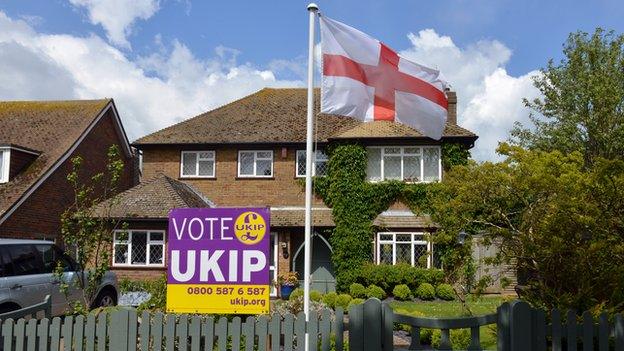
UKIP enjoyed electoral succcess in the European elections
She tells me: "I know South Thanet pretty well and the residents, and they need the right people with the right serious ideas to address this country's problems and the problems here in Thanet as well."
The man who believes he has the right ideas to address those problems is Conservative candidate Craig MacKinlay.
He also happens to be a former UKIP party treasurer and thinks UKIP could damage the Conservative's electoral chances by splitting and encouraging a Labour victory.
'Slow to react'
UKIP may be splitting the vote but so far it hasn't boosted Labour's electoral fortunes in Kent or Sussex, where they currently don't have any MPs.
Labour have been trying to rebuild support in the South East but many say the party has been slow to react to the threat from UKIP.
The Shadow Chancellor Ed Balls says: "It's clearly damaging the Conservatives more, but it's something none of us are complacent about.
"I think come the general election day those UKIP potential voters will come back and see we offer a better alternative [to] another five years of David Cameron."
While Labour and the Tories worry about the UKIP threat. Nigel Farage has had to deal with a number of problems within his own party.
The MEP Godfrey Bloom was forced to resign after he referred to women as sluts. Then, the South East MEP Janice Atkinson had to apologise after she called a Thai constituent a "ting tong" and Nigel Farage had to clarify UKIP's position on NHS funding after he suggested introducing an American-style insurance system.
'Million dollar question'
But why is it that despite sustained negative headlines UKIP's popularity has continued to grow?
"That's the million dollar question - my hunch is that when it comes to UKIP these blue collar, struggling voters who are not feeling the economic recovery are almost prepared to say, 'You know what - I don't care what that candidate has said, right now this is probably the only party that at least is saying it wants to represent my interests,'" says Dr Goodwin.
"I think that is part of Farage's appeal."
Nigel Farage refuses to be drawn on how many seats UKIP could win come May, but tells me: "I'm quietly confident that in this constituency, particularly given, you know, the very strong local team of candidates, that we will win this parliamentary seat and become the biggest party on Thanet District Council."
The South East looks set to be a key battleground in the closest general election for decades.
The big test for Nigel Farage is not just whether he can win in South Thanet but whether UKIP can finally make its breakthrough at a general election.
Watch a full report on BBC Inside Out South East - BBC One on Monday 12 January 19:30 GMT.
- Published21 November 2014
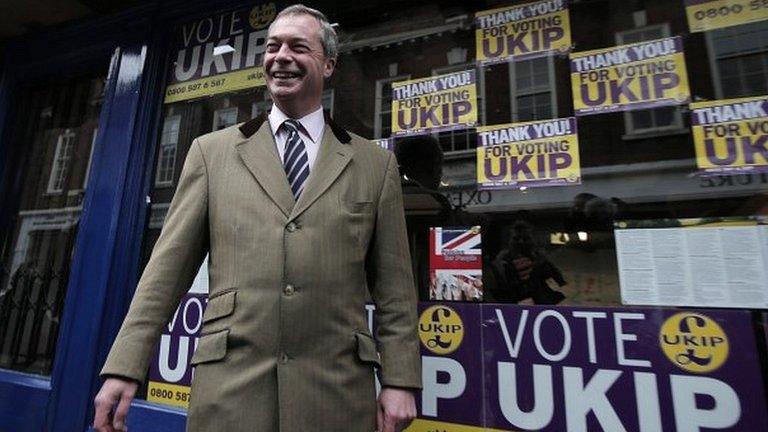
- Published14 November 2014
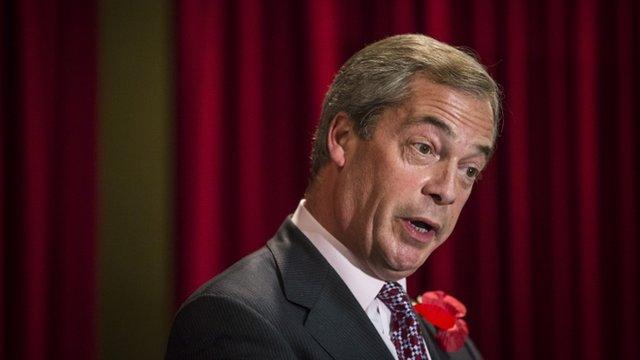
- Published10 October 2014
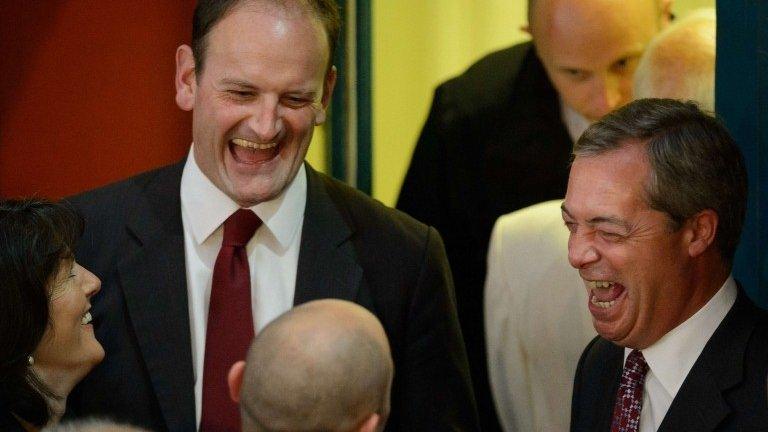
- Published24 September 2013
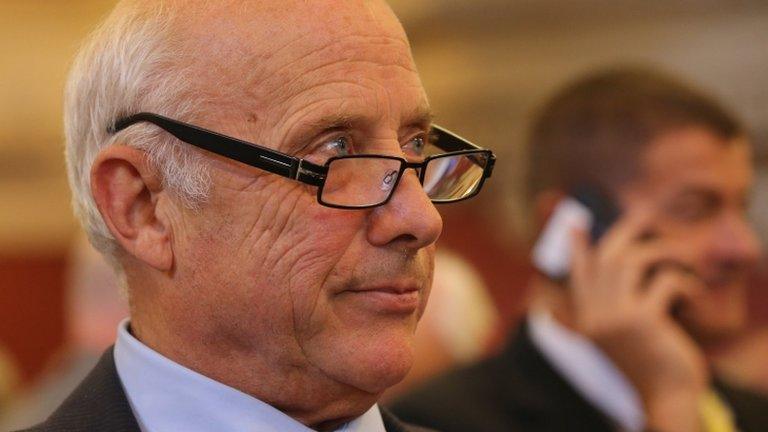
- Published18 August 2014
